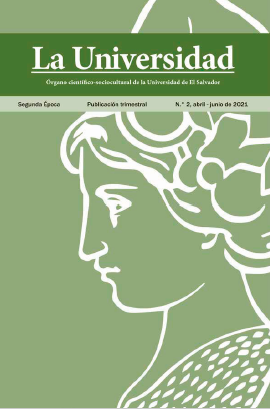La cooperación científica para la asesoría de tesistas del posgrado en la Facultad de Ciencias Médicas, UNAN-LEÓN
Keywords:
Thesis tutoring, Scientific cooperation, Tutorial guidance, PostgraduateAbstract
University of Nicaragua, León, this study had as its objective: to determine the meaning that teachers give to scientific cooperation for the tutorial orientation of the thesis students’ research. postgraduate in the Faculty of Medical Sciences of the aforementioned university, with this it will also be possible to have indications of the extent to which scientific cooperation is exercised for tutorial orientation in this study center. Three research centers with postgraduate programs where training of various master’s degrees and doctorates are carried out were chosen. This choice was the product of the management carried out by the teachers of the Faculty of Medical Sciences UNAN-León assigned as tutors of the intern. The aforementioned research centers are: 1. Research in Occupational Health and the Environment; 2. Research on Demography and Health, and 3. Research on Infectious Diseases. The methodological approach of the research carried out was hermeneutic phenomenological, through which it was possible to arrive, from the teaching experience, at the meaning of scientific cooperation for the tutorial orientation of the postgraduate theses, which, from their own experiences, the advisors perceive it. as a process where: The initial idea of the thesis study is from the advisor, the thesis student or the faculty (of all), is adopted by the advisor and admits it as his own responsibility. The thesis student, on the other hand, assumes and receives from the advisor indications of the operations to be carried out and the motivation to achieve his mission, the thesis student must show vehemently, academic interest in order to maintain further support from the advisor until the defense of the thesis and tangentially from other professors of the faculty, finally the advisors subsume, as tutors, the thesis student’s achievement as their own.
Downloads
References
Álvarez Pérez, P. R. (2013). (PDF) La función tutorial del profesorado universitario: Una nueva competencia de la labor docente en el contexto del Espacio Europeo de Educación Superior. ResearchGate. https://www.researchgate.net/publication/308330960_La_funcion_ tutorial_del_profesorado_universitario_una_nueva_competencia_ de_la_labor_docente_en_el_contexto_del_Espacio_Europeo_de_ Educacion_Superior
Anglat, H. E. D. de. (2011). Las funciones del tutor de la tesis en educación. Revista mexicana de investigación educativa, 16(50), 935-959.
Carnero, M., Ortiz, T., Arzuaga, M., Canfux, V., Guzmán, Y., Tarrió, C. O., Meneses, A., Torres, T., Rodríguez, M. A., González, N. Y., González, B., Hernández, H., Sanz, T., Hernández, A., Ojalvo, V., Travieso, D., Laurencio, A., Castellanos, A. V., García, A. & Curiel, L. (2019). Psicología para la educación superior. La Habana, Cuba: Editorial Félix Varela
Escorcia-Caballero, R., & Gutiérrez-Moreno, A. (2009). La cooperación en educación: Una visión organizativa de la escuela. Educación y Educadores, 12(1), Article 1. https://educacionyeducadores.unisabana. edu.co/index.php/eye/article/view/762
Esparcia, A. C. (2011). Investigación e investigadores. Las revistas científicas como instrumento de comunicación. Vivat Academia, 1002- 1017.
https://doi.org/10.15178/va.2011.117E.1002-1017
Fernández, F. A., Fernández, S. R., Lavastida, M. F., & Fernández, S. (2007). Didáctica: Teoría y práctia (Segunda). Editorial Pueblo y educación
Fuentes-Guerra Soldevilla, M., García Cabrera, M. del M., Llorent García, V. J., & Olivares García, M. Á. (2012). La coordinación docente universitaria desde la percepción del alumnado. REDU. Revista de Docencia Universitaria, 10(2), 395. https://doi.org/10.4995/ redu.2012.6115
Fuster G., D. É. (2019). Investigación cualitativa: Método fenomenológico hermenéutico. Propósitos y Representaciones, 7(1), 201-229. https://doi.org/10.20511/pyr2019.v7n1.267
Martínez, M. J. B., Yus, M. Á. M., & Currás, M. P. (2013). Coordinación docente e interdisciplinariedad: Análisis de su contribución a la adquisición de competencias docentes y discentes. REDU: Revista de Docencia Universitaria, 11(2), 443.
Meneses, A. (2017). Modelo para la cooperación familia-escuela politécnica en los procesos de diagnóstico integral y formación del proyecto de vida profesional. [Tesis no publicada, Universidad de Ciencias pedagógicas ¨Enrique José Varona¨].
Meneses, A., Carnero Sánchez, M., & Arzuaga, M. (2016). Cooperación Familia-Escuela Politécnica en los procesos formativos. 14(1). http://www.pedagogiaprofesional.rimed.cu
Perera F. (2000). La formación interdisciplinaria de los profesores de ciencias. Un ejemplo en el proceso de enseñanza/aprendizaje de las ciencias. [Tesis en opción al Grado Científico de Doctor en Ciencias Pedagógicas]. La Habana, Cuba: Instituto Superior Pedagógico «Enrique José Varona»
Pérez, C. D. Z., Medina, D. E. M., & Rodríguez, K. C. A. (2016). Enseñanza de las competencias de investigación: Un reto en la gestión educativa. Atenas, 1(37), 1-14.
Recio, J. C. M., Pestaña, M. J. M., & López, M. F. B. (2012). Producción y dirección de tesis doctorales sobre publicidad en la universidad española (1971-2010). Revista española de Documentación Científica, 35(3), 433-452. https://doi.org/10.3989/redc.2012.3.890
Roman Collazo, C., Hernandez, Y., Campoverde, D., Baculima, J., & Tamayo, T. (2017). Habilidades científico investigativas de docentes de la Universidad Católica de Cuenca, Ecuador. https://www.researchgate. net/publication/324471615_Habilidades_cientifico_investigativas_ de_docentes_de_la_Universidad_Catolica_de_Cuenca_Ecuador
Santamaría, J. S. (2011). Evaluación de los aprendizajes universitarios: Una comparación sobre sus posibilidades y limitaciones en el Espacio Europeo de Educación Superior. 4, 16.
Senra Valera, A., & Senra Valera, M. (2008). La tesis doctoral de medicina Senra Varela. Diaz de Santos. https://www.editdiazdesantos. com/libros/senra-varela-avelino-la-tesis-doctoral-de-medicina- L03008820101.html
Slavin, R. E. (2014). Cooperative Learning and Academic Achievement: Why Does Groupwork Work?. [Aprendizaje cooperativo y rendimiento académico: ¿por qué funciona el trabajo en grupo?]. Anales de Psicología / Annals of Psychology, 30(3), 785-791. https://doi. org/10.6018/analesps.30.3.201201
Villa, A., & Yániz, C. (1999). Aprendizaje organizativo y desarrollo profesional. Revista de curriculum y formación del profesorado. w.ugr. es/local/recfpro/Rev31
Xin, S. & Carnero Sánchez, M. (2021). La cooperación en la formación de Licenciados en Lengua Española para no Hispanohablantes en la Universidad de La Habana. Revista Cubana de Educación Superior, 40(1).
Downloads
Published
Issue
Section
License
Copyright (c) 2022 Authors who publish in Revista La Universidad agree to the following terms: Authors continue as owners of their works, non-exclusively assigning dissemination rights to La Universidad Journal under the standards of the Attribution-NonCommercial-ShareAlike License: CC BY-NC-SA 4.0. This license allows the use of a work to create another work or content, modifying or not the original work, as long as the author is cited, the resulting work is shared under the same type of license and has no commercial purposes(https://creativecommons.org/licenses/by-nc-sa/4.0/deed.es).

This work is licensed under a Creative Commons Attribution-NonCommercial-ShareAlike 4.0 International License.





